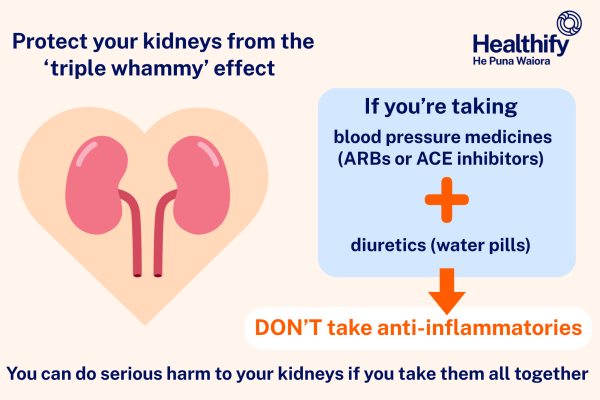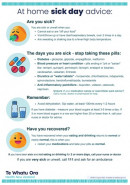You can now add Healthify as a preferred source on Google. Click here to see us when you search Google.
Losartan and hydrochlorothiazide
Key points about losartan and hydrochlorothiazide
- Losartan and hydrochlorothiazide is used to treat high blood pressure.
- It consists of 2 medicines in a single tablet, which work together to control your blood pressure.
- Find out how to take it safely and possible side effects.

The combination of losartan and hydrochlorothiazide is used to treat high blood pressure (hypertension). It consists of 2 medicines in a single tablet, which work together to control your blood pressure. Losartan works by relaxing your blood vessels and hydrochlorothiazide helps your body get rid of extra salt (sodium) and water.
Losartan belongs to a group of medicines called angiotensin receptor blockers (ARBs) and hydrochlorothiazide is a diuretic.
In Aotearoa New Zealand the strength of the losartan and hydrochlorothiazide tablet is losartan 50 mg + hydrochlorothiazide 12.5 mg.
- Always take your medicine exactly as your healthcare provider has told you. The pharmacy label on your medicine will tell you how much to take, how often to take it and any special instructions.
- The usual dose is 1 tablet once a day.
- Depending on your condition, your dose may be increased to 2 tablets once a day.
- Treatment with losartan and hydrochlorothiazide is usually long term, so keep taking it regularly.
If you're pregnant or planning a pregnancy
Losartan can affect your baby's kidneys, especially if it's taken in the second and third trimesters of pregnancy. This can cause long term damage to your baby's kidneys. If you're already pregnant, talk to your healthcare provider straight away. Usually they will be able to prescribe a different medicine that's safe to take during pregnancy.
Losartan should be stopped by the time you're 12 weeks pregnant. Use contraception if you're taking losartan and plan any pregnancy with your healthcare provider, pregnancy specialist (obstetrician) or hospital doctor. They will want to review your medical condition and medicine before you get pregnant.
Most women stop taking losartan before getting pregnant, but some may continue until they have a positive pregnancy test and then stop. Your healthcare provider will talk to you about what's best for you, based on your medical condition and the risks and benefits of losartan.
Severe allergic reaction (angioedema)
You shouldn't take losartan if you've had a severe allergic reaction to an ACE inhibitor in the past, eg, swelling of your face, lips, mouth or tongue (called angioedema). Angioedema is a rare but serious side effect and it can be fatal.
- Timing: Take your dose once a day, in the morning. It's best taken in the morning so it works during the day and your sleep isn't disturbed by getting up to go to the toilet during the night.
- Food: You can take your dose with or without food.
- Limit or avoid alcohol: Alcohol can increase your chance of side effects such as dizziness and light-headedness.
- Missed dose: If you forget to take your dose, take it as soon as you remember that day. But if it's nearly time for your next dose, just take the next dose at the right time. Don't take double the dose.
Monitoring
Your healthcare provider will arrange for you to have blood tests and blood pressure checks before you start taking losartan and hydrochlorothiazide, and during your treatment. This is to check how it's working and to check your kidneys and potassium levels.
Have a sick day plan
If you have diarrhoea (runny poo) or vomiting (being sick) from a stomach bug, or are dehydrated from another illness, it’s important to let your healthcare provider know. They may advise you stop taking losartan and hydrochlorothiazide for a few days, or decrease the dose and start again when you feel better.
Don't take anti-inflammatory pain relief medicines (also called NSAIDs)
Taking losartan and hydrochlorothiazide with NSAIDs (anti-inflammatory pain relief medicines) can be very harmful to your kidneys. It can cause acute kidney injury. This combination is called the ‘dangerous trio’ or ‘triple whammy’. You have a higher risk of harm to your kidneys if you're an older adult (over 65 years) or you're dehydrated. Talk to your healthcare provider about safe pain-relief options for you. Read more about NSAIDs and protecting your kidneys.
Examples of NSAIDs are Ibuprofen (Nurofen, Brufen SR), Diclofenac (Voltaren), Naproxen (Noflam, Naprosyn), Mefenamic acid (Ponstan), Celecoxib (Celebrex), Tenoxicam (Tilcotil).

Image credit: Healthify He Puna Waiora
Read more about the triple whammy effect.
Your skin may be sensitive to sunlight
Take care in the sun, cover up and wear sunblock on sunny days or if spending a lot of time outside, even on a cloudy day.
Like all medicines losartan and hydrochlorothiazide can cause side effects, although not everyone gets them. If you're concerned about any symptoms you think might be related to your medicine, talk to your healthcare provider. The following information offers some guidance but doesn't include all possible side effects.
Common side effects
Tell your healthcare provider if these side effects bother you.
- Headache.
- Stomach upset.
- Sleep problems.
- Muscle cramps, muscle weakness
- Dizziness, feeling lightheaded or faint when you stand up. This is quite common when you first start taking losartan and hydrochlorothiazide and usually goes way with time. Be careful when getting up from either lying down or sitting to avoid falls. These effects put you at risk of falls and injuries, especially if you're an older adult. Stand up slowly. If you do feel dizzy, sit or lie down for a few moments. Avoid alcohol, which can make these side effects worse. If you do feel dizzy or light-headed, don’t drive or operate machinery until you feel better,
Tell your healthcare provider immediately or phone Healthline free on 0800 611 116 if these occur
- Signs of dehydration (losing too much salt and water) such as muscle cramps, weakness, dry mouth, feeling thirsty all the time or passing less urine (pee) than usual.
- Signs and symptoms of gout such as pain and swelling in your joints. Hydrochlorothiazide may raise serum uric acid levels and cause an acute attack of gout for some people.
- Signs of problems with your liver, such as yellowing of your skin or eyes, dark pee (urine) or pain in your abdomen (tummy).
Phone 111 for an ambulance or go to your nearest accident and emergency (A&E) clinic if these occur
Signs of an allergic reaction such as itchy skin, and rash, swollen lips or tongue, problems breathing, like a tight chest or shortness of breath.
Read more about medicines and side effects and reporting a reaction you think might be a side effect.
The following links have more information on losartan and hydrochlorothiazide:
Losartan and hydrochlorothiazide(external link) NZ Formulary Patient Information, NZ
Brochures
At home sick day advice [PDF, 425 KB] Health New Zealand | Te Whatu Ora, NZ, 2023
Medicines and side effects [PDF, 91 KB] Healthify He Puna Waiora, NZ, 2024
5 questions to ask about your medications(external link) Health Quality and Safety Commission, NZ, 2019 English(external link), te reo Māori(external link)
References
- Losartan + hydrochlorothiazide(external link) NZ Formulary, NZ
Brochures

At home sick day advice
Health New Zealand | Te Whatu Ora, 2023

Medicines and side effects
Healthify He Puna Waiora, NZ, 2024

Health Quality and Safety Commission, NZ, 2019 English, te reo Māori
Credits: Healthify He Puna Waiora Pharmacists. Healthify is brought to you by Health Navigator Charitable Trust.
Reviewed by: Angela Lambie, Pharmacist, Auckland
Last reviewed:





